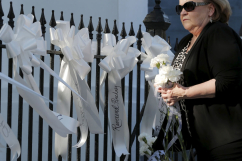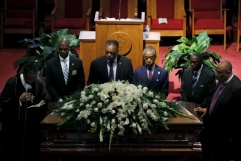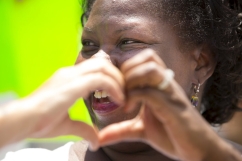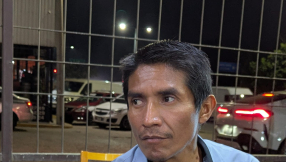Two days after Dylann Roof's killing spree, the relatives of those killed at Emanuel AME Church in Charleston stood up one by one and offered the suspected murderer their forgiveness.
"You took something very precious from me, but I forgive you," Ethel Lance's daughter told him at his bond hearing. "It hurts me. You hurt a lot of people, but may God forgive you."
"We would like you to take this opportunity to repent," said Anthony Thompson, grandson of Myra Thompson, one of the nine victims. "Repent. Confess. Give your life to the one who matters the most, Christ, so he can change your ways no matter what happens to you and you'll be OK."
The following day Cynthia Hurd's husband, Arthur, said: "What I can say to that young man is that in time I will forgive you."
The Bible tells us that we have to forgive. But for many this is just one of the many biblical commands that we struggle to live out. Hearing statements these statements left onlookers wondering just how on earth they managed to utter them, let alone feel the sentiments in their heart, so soon after the event. We must conclude that it is the power of God's grace at work in them.
Supernatural forgiveness
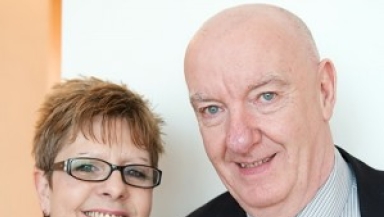
But these relatives are not alone. Remarkably, there are many stories of Christians forgiving those responsible for terrible crimes against them. Ray and Vi Donovan know what it is to forgive a murderer – albeit in very different circumstances. Their son Christopher was killed in 2001, aged 18, by a gang who beat him up when he was walking with his brother to a friend's house one evening. The gang injured both brothers in the attack, and stamped on Chris' head, before dragging him into the road where he was hit by a car.
As they left the hospital having learned that Chris had died, Ray turned to Vi and said that, as Christians, they would have to forgive those responsible. "I went absolutely mad," says Vi. "I just lost it big time. I wasn't thinking about what God wanted. I was thinking of my rage."
Ray also felt angry, but somehow he just knew he had to forgive. "When I became a Christian I realised how much God had forgiven me... boy did he have a lot of forgiving to do," he says.
But not everyone's experience of forgiveness is the same. Jimmy Mizen was killed in south-east London in 2008, the day after his 16<sup>th birthday. His attacker, Jake Fahri, hit him over the head with a glass dish in the local bakery after a minor row became a fatal incident. Like the relatives of the Charleston victims, Jimmy's parents, Margaret and Barry Mizen, found themselves making the headlines after they said the day after attack that they did not feel angry.
"I didn't think about it at first," says Margaret. "I didn't sit down and think 'I need to forgive him'." Instead, she says, "we spoke about anger, and letting go of anger – because anger breeds anger, and that's how Jimmy died."
They were puzzled by the media's response, having not thought that they had said anything about forgiveness. "But we realised as time went on that actually we do forgive him. We forgive him because it's for ourselves. By forgiving him it means that we can get through each day. It doesn't mean that it doesn't matter."
Although she says she found it easy to forgive, she adds that it "doesn't mean to say that each day is easy, because it's not. You still have to get through each day." She also acknowledges that Barry would probably say he didn't find it so easy to forgive.
But she says she knows without doubt that God has been with them. "From the moment that my Jimmy died, God was there walking beside me, helping me, guiding me." In speaking about letting go of anger that day, she says she believes that God was speaking through her. "I believe with all my heart that the words that came out of my mouth were God's."
Vi says it took her a year before she was able to think about forgiving her son's killers, but even so she thinks there was something powerful in Ray's decision to speak out the words of forgiveness, whether or not he felt them at the time. "It was like he was putting a stake in the ground saying 'enough, devil'."
And although Ray realised quickly that he needed to forgive, it didn't happen naturally or instantaneously but instead was – and is – an ongoing process of committing it daily to God. "Today we still get angry," say Vi. "It's what you do with that anger that God's interested in, and how you deal with it in your heart."
"When I feel angry, I get in touch with God and say 'Here I go again, help me'," Ray adds. "You can't do it in your strength... We're not special people. It's the power of God, and we give him the glory."
"If it was about us, me and Ray would have gone and killed those boys a long time ago," says Vi. "The power of the Holy Spirit continues to help you to forgive if you want it. But of course you've got to want it."
They see it as a defining point that they are able to talk about their son's killers, and mention their names, without feeling bitter. With a sense of marvel in her voice, Vi says she still finds it "intriguing" to think of God's amazing grace that has enabled them to forgive.
Facing a killer
In the first year after Chris' death, when Vi was struggling with the very idea of forgiveness, a pastor at their church came up to her and said "Jesus loves the boys who killed your son". Though she admits that she went home afterwards and thought "Who the hell does he think he is?" she knew that he meant it in love – and that what he had said was true. She knew that Jesus would forgive the three boys responsible, and it made her think about her own response.
In court, when the young men were convicted of Chris' murder, Ray says he couldn't help but feel that no one had won except the lawyers. Speaking about the boys and their families Vi says: "When you look to the other side, and you realise the truth of what God's telling you, then some compassion – regardless of the rage you feel – comes back into you." Finding some way to recognise that those who have hurt you are human, not animals, can be a key to forgiveness, they say.
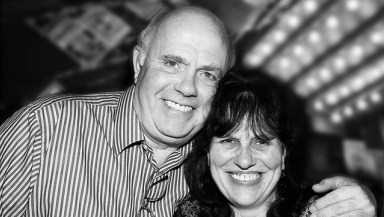
In the days after Jimmy's murder, Margaret was quoted saying: "I feel for the parents of this boy. I don't know why, I can't get them out of my mind because what's happened to Jimmy is the worst thing possible, but we've got such wonderful memories.
"They haven't got wonderful memories for their son. All they can think about is the evil he's done. My prayers are with the family, that's all I can say. I can't, I don't feel anger."
Many people ask the Mizens whether they would want to meet Jake Fahri, but Margaret says she doesn't feel she needs to. "For me, I don't even need to think about the person who killed Jimmy. He's in prison, I know he'll come out one day, but I don't need to think about him."
The Donovans, however, were keen to meet their son's killers. "We wanted to tell them that we had forgiven them," says Vi. They had long advocated for restorative justice (encouraging criminals to meet and reconcile with those affected by their crimes), but it took 11 years before they were able to meet those convicted of Chris' murder, by which point they were out of prison.
They invited all three to come to Chris' grave to offer some form of apology to him. While they were there they told them that Chris would want them to get on with their lives. One of them, Stephen, asked if he could come back to the grave but worried what people might think. "If anyone asks, just say you're Christopher's friend," Ray told him, adding: "We can't change the past, but we can move on in the future between us."
The power of letting go
Archbishop Desmond Tutu famously said that "To forgive is not just to be altruistic, it is the best form of self-interest." All of the parents say they recognised that they needed to forgive their sons' killers for their own benefit.
Their overwhelming message is that it "sets you free." "When we hold on to hate and anger, it destroys us. It's like a poison," says Margaret. For her, forgiveness simply means "that I don't want to do to Jake what he did to Jimmy. It means that I can get up each day with love in my heart. I can looking out of my window and see the trees blossoming in the garden, instead of waking up and looking out and seeing this dark, horrible picture."
In different ways, both sets of parents have become activists for peace and reconciliation since their sons' deaths, and through this have come into contact with many others who have experienced similar tragedies. They say there's a recognisable difference – even physically sometimes – between those who have been able to forgive, and those who haven't.
Margaret says she finds it sad to see people who aren't able to forgive. "Life becomes incredibly difficult for them... I've met so many people who live full of hate... for the person who's killed their son or daughter or husband or wife, and the only way they can talk about them is in a hate-filled way."
But forgiving yourself can be particularly hard, says Ray, who refused to drive Chris to his friend's house that evening and so for some time blamed himself for his son's death. Having also shared their experience with numerous prisoners, the Donovans have heard the other side too, and heard how difficult it can be for criminals to forgive themselves. One man they spoke to recently couldn't even produce the words 'I forgive myself'.
They have also seen the power of forgiveness for Chris' killers. Ray says: "When we met Stephen he didn't walk in the room, he ran over and grabbed me, squeezed every bit of blood out of me and cried on my shoulder like a baby saying he was sorry."
The compassion they have been able to show has had a ripple effect – not only through sharing their story further afield, but also for the criminals' families. Stephen's wife wrote to them to thank them and saying how knowing he was forgiven had changed her husband. They also addressed a school recently and found that Ryan's nephew was among the pupils. He came up to them to thank them for the way they had spoken about his family, despite what they had been through.
Though their experiences are different, both families speak about the importance of recognising God's call to forgive. They highlight the words of the Lord's Prayer: "forgive us our sins, as we have forgiven those who sin against us" and how easy it is sometimes to say those words without thinking.
But forgiveness is not an easy thing to do, and certainly not in our own strength, "because it goes against everything you feel inside when someone hurts you" Vi says. But, she adds: "Jesus said you must forgive. Not 'would you like to try it', or 'have a go'. That's how important it was to him."
Seeing the response of the victims' relatives in Charleston, Ray says their response was "Hallelujah!" adding that they smiled at the thought that "Jesus had spoken to them too."
Ray and Vi set up the Chris Donovan Trust in their son's memory, and they speak to many people about the power of restorative justice. Through Foundation for Jimmy, the Mizen family teach young people about the consequences of violent crime. Barry and Margaret have also written a book about their story, Jimmy: A Legacy of Peace (Lion, 2013).










